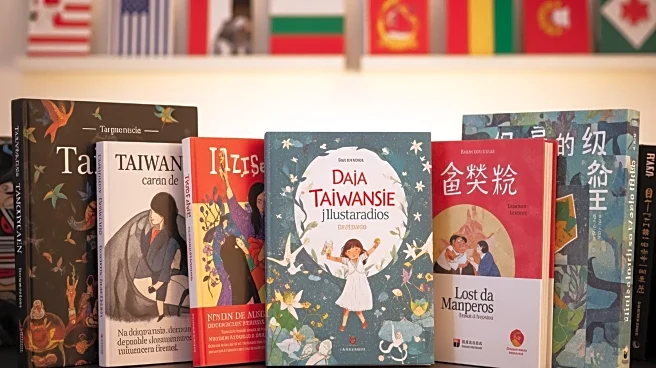What's Happening?
Taiwanese authors and illustrators are gaining traction in Spanish-speaking markets, particularly in the children's book and comics segments. Notable figures like Jimmy Liao have seen their works, such as 'Where Will I Be Tomorrow?', translated into Spanish,
sparking interest in Taiwanese literature. The children's book market in Mexico has embraced Taiwanese picture books that explore universal themes like empathy and imagination. Authors like Wang Wei-Hsuan and Chiang Meng-Yun have successfully sold their works to Mexican publishers. Additionally, Taiwanese comics, influenced by Japanese manga, are finding a growing audience, with significant rights purchases by Spanish publishers. The Guadalajara Book Fair will feature Taiwanese illustrators Hsueh Hui-Yin and Ding Pao-Yen, showcasing their culturally rich and imaginative works.
Why It's Important?
The expansion of Taiwanese literature into Spanish-speaking markets highlights the increasing global interest in diverse cultural narratives. This trend not only broadens the reach of Taiwanese authors but also enriches the literary landscape in Spanish-speaking countries with unique perspectives. The success of Taiwanese works in these markets could lead to more cross-cultural exchanges and collaborations, benefiting both the creators and the readers. For the publishing industry, this represents a lucrative opportunity to tap into new markets and diversify their offerings. The growing popularity of Taiwanese comics and picture books also reflects a shift towards more inclusive and varied storytelling, which can have a lasting impact on cultural understanding and appreciation.
What's Next?
The continued participation of Taiwanese authors and illustrators in international book fairs, such as the Guadalajara Book Fair, is likely to further enhance their visibility and influence. As more works are translated and published, there may be increased interest from other regions, potentially leading to a broader global presence for Taiwanese literature. Publishers and literary agents may seek to capitalize on this trend by exploring additional translation and distribution opportunities. The success of Taiwanese authors in Spanish-speaking markets could also inspire other non-Western authors to pursue similar paths, contributing to a more diverse and interconnected global literary community.
Beyond the Headlines
The rise of Taiwanese literature in Spanish-speaking markets underscores the importance of cultural exchange in the global literary scene. It highlights how literature can serve as a bridge between different cultures, fostering mutual understanding and appreciation. This development also raises questions about the role of translation in preserving the nuances of original works while making them accessible to a wider audience. As Taiwanese authors continue to gain recognition, there may be increased discussions about the representation of Asian cultures in Western-dominated literary spaces and the potential for literature to challenge stereotypes and broaden perspectives.

















